2019年高考英语全国I卷试卷分析及备考建议(PPT 30张)
- 格式:pptx
- 大小:870.29 KB
- 文档页数:30
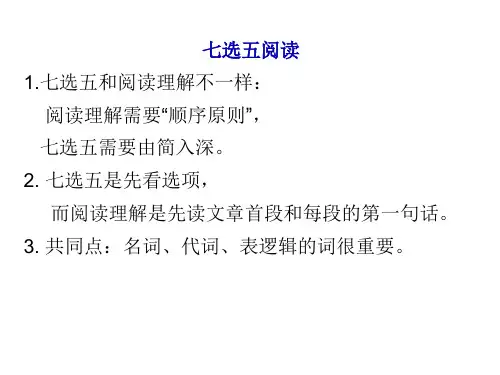
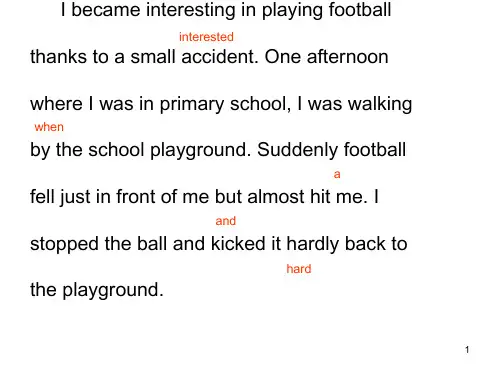
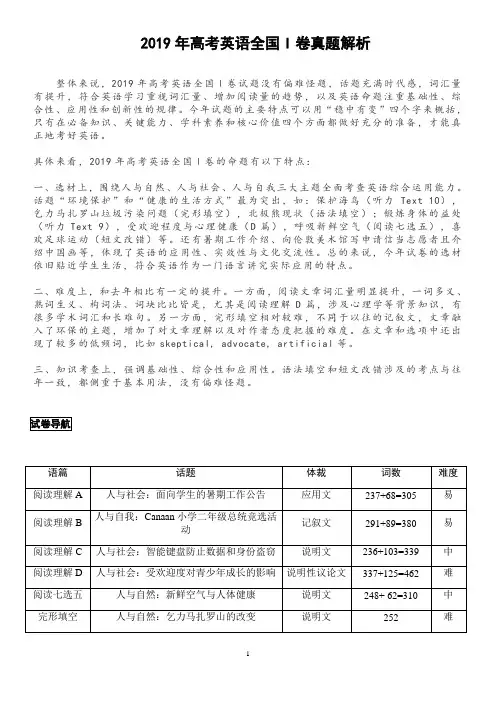
2019年高考英语全国I卷真题解析整体来说,2019年高考英语全国Ⅰ卷试题没有偏难怪题,话题充满时代感,词汇量有提升,符合英语学习重视词汇量、增加阅读量的趋势,以及英语命题注重基础性、综合性、应用性和创新性的规律。
今年试题的主要特点可以用“稳中有变”四个字来概括,只有在必备知识、关键能力、学科素养和核心价值四个方面都做好充分的准备,才能真正地考好英语。
具体来看,2019年高考英语全国Ⅰ卷的命题有以下特点:一、选材上,围绕人与自然、人与社会、人与自我三大主题全面考查英语综合运用能力。
话题“环境保护”和“健康的生活方式”最为突出,如:保护海鸟(听力Text 10),乞力马扎罗山垃圾污染问题(完形填空),北极熊现状(语法填空);锻炼身体的益处(听力Text 9),受欢迎程度与心理健康(D篇),呼吸新鲜空气(阅读七选五),喜欢足球运动(短文改错)等。
还有暑期工作介绍、向伦敦美术馆写申请信当志愿者且介绍中国画等,体现了英语的应用性、实效性与文化交流性。
总的来说,今年试卷的选材依旧贴近学生生活,符合英语作为一门语言讲究实际应用的特点。
二、难度上,和去年相比有一定的提升。
一方面,阅读文章词汇量明显提升,一词多义、熟词生义、构词法、词块比比皆是,尤其是阅读理解D篇,涉及心理学等背景知识,有很多学术词汇和长难句。
另一方面,完形填空相对较难,不同于以往的记叙文,文章融入了环保的主题,增加了对文章理解以及对作者态度把握的难度。
在文章和选项中还出现了较多的低频词,比如skeptical, advocate, artificial等。
三、知识考查上,强调基础性、综合性和应用性。
语法填空和短文改错涉及的考点与往年一致,都侧重于基本用法,没有偏难怪题。
第二部分阅读理解 (共两节,满分40分)第一节 (共15小题;每小题2分,满分30分)阅读下列短文,从每题所给的A、B、C和D四个选项中,选出最佳选项。
ANeed a Job This Summer?The provincial government and its partners offer many programs to help students find summer jobs. The deadlines and what you need to apply depend on the program.Not a student? Go to the government website to learn about programs and online tools available to help people under 30 build skills, find a job or start businesses all year round.Jobs for YouthIf you are a teenager living in certain parts of the province, you could be eligible (符合条件) for this program, which provides eight weeks of paid employment along with training.Who is eligible: Youth 15-18 years old in select communities (社区).Summer CompanySummer Company provides students with hands-on business training and awards of up to $3,000 to start and run their own summer businesses.Who is eligible: Students aged 15-29, returning to school in the fall.Stewardship Youth Ranger ProgramYou could apply to be a Stewardship Youth Ranger and work on local natural resource management projects for eight weeks this summer.Who is eligible: Students aged 16 or 17 at time of hire, but not turning 18 before December 31 this year.Summer Employment Opportunities (机会)Through the Summer Employment Opportunities program, students are hired each year in a variety of summer positions across the Provincial Public Service, its related agencies and community groups.Who is eligible: Students aged 15 or older. Some positions require students to be 15 to 24 or up to 29 for persons with a disability.21. What is special about Summer Company?A. It requires no training before employment.B. It provides awards for running new businesses.C. It allows one to work in the natural environment.D. It offers more summer job opportunities.22. What is the age range required by Stewardship Youth Ranger Program?A. 15-18.B. 15-24.C. 15-29.D. 16-17.23. Which program favors the disabled?A. Jobs for Youth.B. Summer Company.C. Stewardship Youth Ranger Program.D. Summer Employment Opportunities.答案与解析21. B 事实细节题根据第五段Summer Company provides students with hands-on business training and awards of up to $3,000 to start and run their own summer businesses. 可知,Summer Company 为创业者提供奖金。
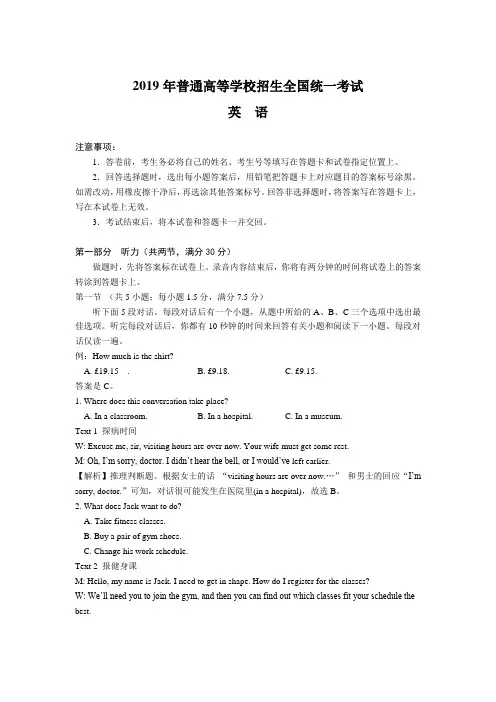
2019年普通高等学校招生全国统一考试英语注意事项:1.答卷前,考生务必将自己的姓名、考生号等填写在答题卡和试卷指定位置上。
2.回答选择题时,选出每小题答案后,用铅笔把答题卡上对应题目的答案标号涂黑。
如需改动,用橡皮擦干净后,再选涂其他答案标号。
回答非选择题时,将答案写在答题卡上,写在本试卷上无效。
3.考试结束后,将本试卷和答题卡一并交回。
第一部分听力(共两节,满分30分)做题时,先将答案标在试卷上。
录音内容结束后,你将有两分钟的时间将试卷上的答案转涂到答题卡上。
第一节(共5小题;每小题1.5分,满分7.5分)听下面5段对话。
每段对话后有一个小题,从题中所给的A、B、C三个选项中选出最佳选项。
听完每段对话后,你都有10秒钟的时间来回答有关小题和阅读下一小题。
每段对话仅读一遍。
例:How much is the shirt?A. £19.15 .B. £9.18.C. £9.15.答案是C。
1. Where does this conversation take place?A. In a classroom.B. In a hospital.C. In a museum.Text 1 探病时间W: Excuse me, sir, visiting hours are over now. Your wife must get some rest.M: Oh, I’m sorry, doctor. I didn’t hear the bell, or I would’ve left earlier.【解析】推理判断题。
根据女士的话“visiting hours are over now.…”和男士的回应“I’m sorry, doctor.”可知,对话很可能发生在医院里(in a hospital),故选B。
2. What does Jack want to do?A. Take fitness classes.B. Buy a pair of gym shoes.C. Change his work schedule.Text 2 报健身课M: Hello, my name is Jack. I need to get in shape. How do I register for the classes?W: We’ll need you to join the gym, and then you can find out which classes fit your schedule the best.【解析】推理判断题。
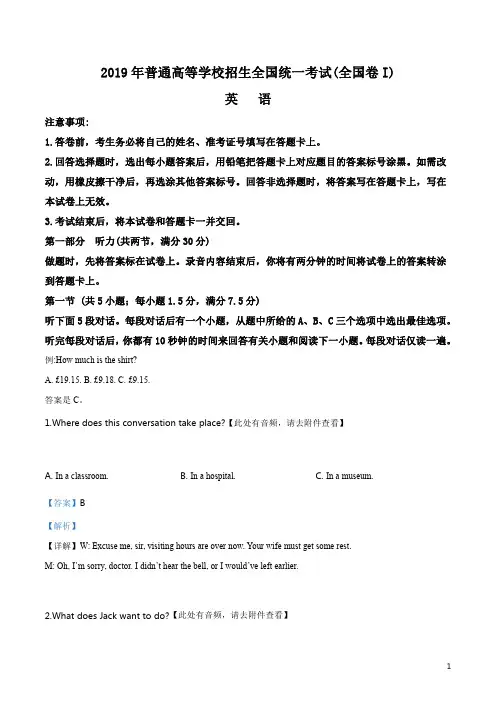
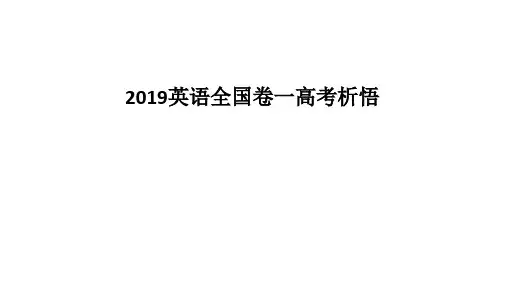

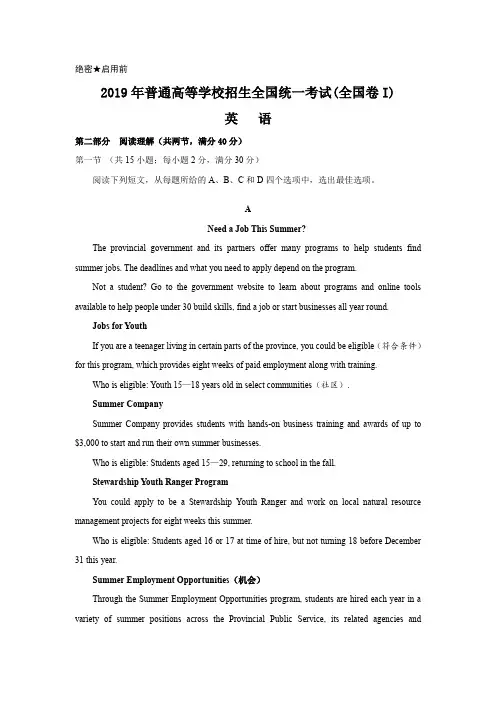
绝密★启用前2019年普通高等学校招生全国统一考试(全国卷I)英语第二部分阅读理解(共两节,满分40分)第一节(共15小题;每小题2分,满分30分)阅读下列短文,从每题所给的A、B、C和D四个选项中,选出最佳选项。
ANeed a Job This Summer?The provincial government and its partners offer many programs to help students find summer jobs. The deadlines and what you need to apply depend on the program.Not a student? Go to the government website to learn about programs and online tools available to help people under 30 build skills, find a job or start businesses all year round.Jobs for YouthIf you are a teenager living in certain parts of the province, you could be eligible(符合条件)for this program, which provides eight weeks of paid employment along with training.Who is eligible: Youth 15—18 years old in select communities(社区).Summer CompanySummer Company provides students with hands-on business training and awards of up to $3,000 to start and run their own summer businesses.Who is eligible: Students aged 15—29, returning to school in the fall.Stewardship Youth Ranger ProgramYou could apply to be a Stewardship Youth Ranger and work on local natural resource management projects for eight weeks this summer.Who is eligible: Students aged 16 or 17 at time of hire, but not turning 18 before December 31 this year.Summer Employment Opportunities(机会)Through the Summer Employment Opportunities program, students are hired each year in a variety of summer positions across the Provincial Public Service, its related agencies andcommunity groups.Who is eligible: Students aged 15 or older. Some positions require students to be 15 to 24 or up to 29 for persons with a disability.21. What is special about Summer Company?A. It requires no training before employment.B. It provides awards for running new businesses.C. It allows one to work in the natural environment.D. It offers more summer job opportunities.22. What is the age range required by Stewardship Youth Ranger Program?A.15—18.B.15—24.C.15—29.D.16—17.23. Which program favors the disabled?A. Jobs for Youth.B. Summer Company.C. Stewardship Youth Ranger Program.D. Summer Employment Opportunities.BFor Canaan Elementary’s second grade in Patchogue, N.Y.,today is speech day, and right now it’s Chris Palaez’s turn. The 8-year-old is the joker of the class. With shining dark eyes, he seems like the kind of kid who would enjoy public speaking.But he’s nervous."I’m here to tell you today why you should … should…"Chris trips on the"-ld,"a pronunciation difficulty for many non-native English speakers. His teacher, Thomas Whaley, is next to him, whispering support."…Vo te for …me…"Except for some stumbles, Chris is doing amazingly well. When he brings his speech to a nice conclusion, Whaley invites the rest of the class to praise him.A son of immigrants, Chris started learning English a little over three years ago. Whaley recalls(回想起)how at the beginning of the year, when called upon to read, Chris would excuse himself to go to the bathroom.Learning English as a second language can be a painful experience. What you need is a great teacher who lets you make mistakes. "It takes a lot for any student,"Whaley explains, "especially for a student who is learning English as their new language, to feel confident enough to say, ‘I don’t know,but I want to know.’"Whaley got the idea of this second-grade presidential campaign project when he asked the children one day to raise their hands if they thought they could never be a president. The answer broke his heart. Whaley says the project is about more than just learning to read and speak inpublic. He wants these kids to learn to boast(夸耀)about themselves."Boasting about yourself, and your best qualities,"Whaley says, "is very difficult for a child who came into the classroom not feeling confident."24. What made Chris nervous?A. Telling a story.B. Making a speech.C. Taking a test.D. Answering a question.25. What does the underlined word "stumbles"in paragraph 2 refer to?A. Improper pauses.B. Bad manners.C. Spelling mistakes.D. Silly jokes.26. W e can infer that the purpose of Whaley’s project is to _________.A. help students see their own strengthsB. assess students’ public speaking skillsC. prepare students for their future jobsD. inspire students’ love for politics27. Which of the following best describes Whaley as a teacher?A. Humorous.B. Ambitious.C. Caring.D. Demanding.CAs data and identity theft becomes more and more common, the market is growing for biometric(生物测量)technologies—like fingerprint scans—to keep others out of private e-spaces. At present, these technologies are still expensive, though.Researchers from Georgia Tech say that they have come up with a low-cost device(装置)that gets around this problem: a smart keyboard. This smart keyboard precisely measures the cadence (节奏)with which one types and the pressure fingers apply to each key. The keyboard could offer a strong layer of security by analyzing things like the force of a user’s typing and the time between key presses. These patterns are unique to each person. Thus, the keyboard can determine people’s identities, and by extension, whether they should be given access to the computer it’s connected to —regardless of whether someone gets the password right.It also doesn’t require a new type of technology that people aren’t already familiar with. Everybody uses a keyboard and everybody types differently.In a study describing the technology, the researchers had 100 volunteers type the word "touch"four times using the smart keyboard. Data collected from the device could be used torecognize different participants based on how they typed, with very low error rates. The researchers say that the keyboard should be pretty straightforward to commercialize and is mostly made of inexpensive, plastic-like parts. The team hopes to make it to market in the near future.28. Why do the researchers develop the smart keyboard?A. To reduce pressure on keys.B. To improve accuracy in typingC. To replace the password system.D. To cut the cost of e-space protection.29. What makes the invention of the smart keyboard possible?A. Computers are much easier to operate.B. Fingerprint scanning techniques develop fast.C. Typing patterns vary from person to person.D. Data security measures are guaranteed.30. What do the researchers expect of the smart keyboard?A. It’ll be environment-friendly.B. It’ll reach consumers soon.C. It’ll be made of plastics.D. It’ll help speed up typing.31. Where is this text most likely from?A. A diary.B. A guidebookC. A novel.D. A magazine.DDuring the rosy years of elementary school(小学), I enjoyed sharing my dolls and jokes, which allowed me to keep my high social status. I was the queen of the playground. Then came my tweens and teens, and mean girls and cool kids. They rose in the ranks not by being friendly but by smoking cigarettes, breaking rules and playing jokes on others, among whom I soon found myself.Popularity is a well-explored subject in social psychology. Mitch Prinstein, a professor of clinical psychology sorts the popular into two categories: the likable and the status seekers. The likables’plays-well-with-others qualities strengthen schoolyard friendships, jump-start interpersonal skills and, when tapped early, are employed ever after in life and work. Then there’s the kind of popularity that appears in adolescence: status born of power and even dishonorable behavior.Enviable as the cool kids may have seemed, Dr. Prinstein’s studies show unpleasant consequences. Those who were highest in status in high school, as well as those least liked inelementary school, are "most likely to engage(从事)in dangerous and risky behavior."In one study, Dr. Prinstein examined the two types of popularity in 235 adolescents, scoring the least liked, the most liked and the highest in status based on student surveys(调查研究). "We found that the least well-liked teens had become more aggressive over time toward their classmates. But so had those who were high in status. It clearly showed that while likability can lead to healthy adjustment, high status has just the opposite effect on us."Dr. Prinstein has also found that the qualities that made the neighbors want you on a play date-sharing, kindness, openness —carry over to later years and make you better able to relate and connect with others.In analyzing his and other research,Dr. Prinstein came to another conclusion: Not only is likability related to positive life outcomes, but it is also responsible for those outcomes, too. "Being liked creates opportunities for learning and for new kinds of life experiences that help somebody gain an advantage, "he said.32. What sort of girl was the author in her early years of elementary school?A. Unkind.B. Lonely.C. Generous.D. Cool.33.What is the second paragraph mainly about?A. The classification of the popular.B. The characteristics of adolescents.C. The importance of interpersonal skills.D. The causes of dishonorable behavior.34. What did Dr. Prinstein’s study find ab out the most liked kids?A. They appeared to be aggressive.B. They tended to be more adaptable.C. They enjoyed the highest status.D. They performed well academically.35. What is the best title for the text?A. Be Nice—You Won’t Finish LastB. The Higher the Status, the BetterC. Be the Best—You Can Make ItD. More Self-Control, Less Aggressiveness第二节(共5小题;每小题2分,满分10分)根据短文内容,从短文后的选项中选出能填入空白处的最佳选项。
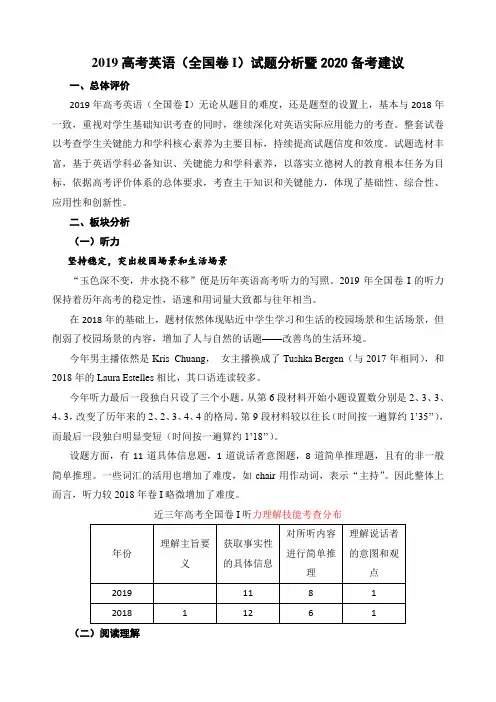
2019高考英语(全国卷I)试题分析暨2020备考建议一、总体评价2019年高考英语(全国卷I)无论从题目的难度,还是题型的设置上,基本与2018年一致,重视对学生基础知识考查的同时,继续深化对英语实际应用能力的考查。
整套试卷以考查学生关键能力和学科核心素养为主要目标,持续提高试题信度和效度。
试题选材丰富,基于英语学科必备知识、关键能力和学科素养,以落实立德树人的教育根本任务为目标,依据高考评价体系的总体要求,考查主干知识和关键能力,体现了基础性、综合性、应用性和创新性。
二、板块分析(一)听力坚持稳定,突出校园场景和生活场景“玉色深不变,井水挠不移”便是历年英语高考听力的写照。
2019年全国卷I的听力保持着历年高考的稳定性,语速和用词量大致都与往年相当。
在2018年的基础上,题材依然体现贴近中学生学习和生活的校园场景和生活场景,但削弱了校园场景的内容,增加了人与自然的话题——改善鸟的生活环境。
今年男主播依然是Kris Chuang,女主播换成了Tushka Bergen(与2017年相同),和2018年的Laura Estelles相比,其口语连读较多。
今年听力最后一段独白只设了三个小题。
从第6段材料开始小题设置数分别是2、3、3、4、3,改变了历年来的2、2、3、4、4的格局。
第9段材料较以往长(时间按一遍算约1’35’’),而最后一段独白明显变短(时间按一遍算约1’18’’)。
设题方面,有11道具体信息题,1道说话者意图题,8道简单推理题,且有的非一般简单推理。
一些词汇的活用也增加了难度,如chair用作动词,表示“主持”。
因此整体上而言,听力较2018年卷I略微增加了难度。
近三年高考全国卷I听力理解技能考查分布(二)阅读理解深度发掘文章思想内涵,引导关注人类命运共同体阅读理解语篇题材广泛,体裁多样。
A篇是4则面向学生的暑期工作公告,弘扬劳动精神,倡导工作意识;B篇通过记叙小学教师组织学生演讲来帮助学生提高自信心的教学实践,重视思维品质;C篇介绍了一种成本低但精确度很高的智能键盘,重视科学性、时代性、知识性;D篇从社会心理学视角讨论青少年小学与中学阶段的成长和经历,论述了个体受欢迎程度这一青少年心理健康话题,倡导和谐的人际关系。
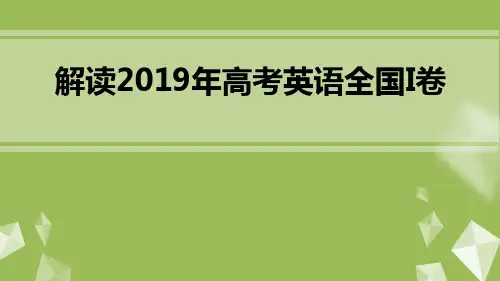
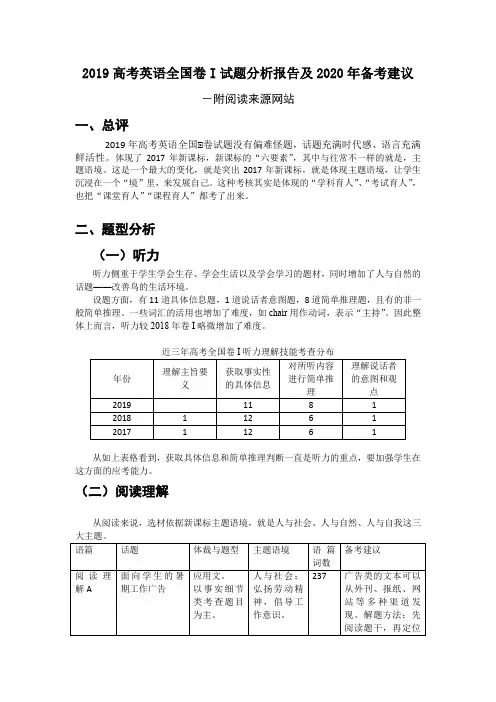
2019高考英语全国卷I试题分析报告及2020年备考建议-附阅读来源网站一、总评2019年高考英语全国Ⅰ卷试题没有偏难怪题,话题充满时代感、语言充满鲜活性。
体现了2017年新课标,新课标的“六要素”,其中与往常不一样的就是,主题语境。
这是一个最大的变化,就是突出2017年新课标,就是体现主题语境,让学生沉浸在一个“境”里,来发展自己。
这种考核其实是体现的“学科育人”、“考试育人”,也把“课堂育人”“课程育人”都考了出来。
二、题型分析(一)听力听力侧重于学生学会生存、学会生活以及学会学习的题材,同时增加了人与自然的话题——改善鸟的生活环境。
设题方面,有11道具体信息题,1道说话者意图题,8道简单推理题,且有的非一般简单推理。
一些词汇的活用也增加了难度,如chair用作动词,表示“主持”。
因此整体上而言,听力较2018年卷I略微增加了难度。
从如上表格看到,获取具体信息和简单推理判断一直是听力的重点,要加强学生在这方面的应考能力。
(二)阅读理解从阅读来说,选材依据新课标主题语境,就是人与社会、人与自然、人与自我这三今年阅读的选材,有一个最大的变化,就是增加了人文社会科学的篇目。
以前偏重于科技和人类生活。
因为新课标将英语核心素养定位为: 工具性、人文性和時代性。
“人文性”和“時代性”在今年的考题中逐渐的显露出来。
人文,包括社会科学和艺术这种因素要增加。
即使科技类的,从语言上也更偏重于从文学的角度讲述科学。
这就是新课标提到的培养学生两大目标“科学精神”和“人文情怀”,打造两个关键的品格。
(三)完形填空概要:乞力马扎罗山因登山者活动而造成的环境污染及努力治理之后环境的改观。
从主题语境选材来看,体现的是人与自然。
不同于以往的记叙文,文章融入了环保的主题,增加了对文章理解以及对作者态度把握的难度。
在文章和选项中还出现了较多的低频词,比如skeptical, advocate, artificial 等,以及语篇里熟词生义,如envelop等。
2019年高考英语全国 I 卷试题分析都昌二中高三备课组一、试题基本情况2019 年高考英语全国 I 卷命题立足全面发展育人目标,落实构建德智体美劳全面培养教育体系,依据高考评价体系的总体要求,以立德树人为教育根本任务,进一步深化考试内容改革,严格控制试卷难度,为高校选拔人才服务的同时助力引导中学英语教学和素质教育。
试题继续保持结构稳定,有效地考查了学生的综合语言运用能力。
选材广泛,选材围绕人与自我、人与社会、人与自然三大主题。
题材丰富、体裁多样、时代性强,充分体现了高考命题的思想性和育人功能。
题型设置稳定,难度适中,既重视对学生基础知识的考察,又体现出语言的交际功能,强调了英语学科核心素养的渗透。
难度呈阶梯分布,难中易题比例合理,有一定的区分度。
二、试卷结构进行逐项分析1. 听力本卷听力语速适中,比 2018 年更趋稳定。
听力情景设置丰富,贴近学生生活。
内容涉及学校生活、成人教育、运动健身、环境保护等方方面面。
设问方式多以 When? Who? What? Why? How? 为主要设题方式,重点考察学生获取具体事实性信息的能力和推理判断能力。
2.阅读四篇文章分别取材于不同领域,题材涉及到社会、生活、科技、人文等方面。
体裁包括应用文、记叙文和说明文。
A 篇是一篇典型的应用文,介绍了政府与商家合作为学生提供暑期工作机会,体现了人与社会的主题。
应用文设题点多以细节理解题为主,考察学生检索和筛查具体信息的能力。
B 篇是一篇记叙文,讲述了一位小学教师帮助和鼓励一位移民学生在学习英语的过程中建立自信的故事。
文章渗透了浓浓的人文关怀,传递了正能量,给人以鼓舞。
记叙文的考察点多以推理判断为主,本文就设置了猜词(第 25 题)、推断写作意图(第 26 题)和推断人物品质(第 27 题)的考题。
C 篇是一篇说明文,介绍当前科技的发展,体现了人与科技的主题。
随着网络时代的到来,网络隐私和安全成为人们关注的焦点,科学家研制出一款智能键盘,通过敲击键盘的不同节奏来识别人物信息,极大程度地增强了网络安全,保护了个人隐私。
2019高考英语(全国卷I)试题分析暨2020备考建议一、总体评价2019年高考英语(全国卷I)无论从题目的难度,还是题型的设置上,基本与2018年一致,重视对学生基础知识考查的同时,继续深化对英语实际应用能力的考查。
整套试卷以考查学生关键能力和学科核心素养为主要目标,持续提高试题信度和效度。
试题选材丰富,基于英语学科必备知识、关键能力和学科素养,以落实立德树人的教育根本任务为目标,依据高考评价体系的总体要求,考查主干知识和关键能力,体现了基础性、综合性、应用性和创新性。
二、板块分析(一)听力坚持稳定,突出校园场景和生活场景“玉色深不变,井水挠不移”便是历年英语高考听力的写照。
2019年全国卷I的听力保持着历年高考的稳定性,语速和用词量大致都与往年相当。
在2018年的基础上,题材依然体现贴近中学生学习和生活的校园场景和生活场景,但削弱了校园场景的内容,增加了人与自然的话题——改善鸟的生活环境。
今年男主播依然是Kris Chuang,女主播换成了Tushka Bergen(与2017年相同),和2018年的Laura Estelles相比,其口语连读较多。
今年听力最后一段独白只设了三个小题。
从第6段材料开始小题设置数分别是2、3、3、4、3,改变了历年来的2、2、3、4、4的格局。
第9段材料较以往长(时间按一遍算约1’35’’),而最后一段独白明显变短(时间按一遍算约1’18’’)。
设题方面,有11道具体信息题,1道说话者意图题,8道简单推理题,且有的非一般简单推理。
一些词汇的活用也增加了难度,如chair用作动词,表示“主持”。
因此整体上而言,听力较2018年卷I略微增加了难度。
深度发掘文章思想内涵,引导关注人类命运共同体阅读理解语篇题材广泛,体裁多样。
A篇是4则面向学生的暑期工作公告,弘扬劳动精神,倡导工作意识;B篇通过记叙小学教师组织学生演讲来帮助学生提高自信心的教学实践,重视思维品质;C篇介绍了一种成本低但精确度很高的智能键盘,重视科学性、时代性、知识性;D篇从社会心理学视角讨论青少年小学与中学阶段的成长和经历,论述了个体受欢迎程度这一青少年心理健康话题,倡导和谐的人际关系。
徐老师2019年普通高等学校招生全国统一考试(全国卷1)英语注意事项:1.答卷前,考生务必将自己的姓名、准考证号填写在答题卡上。
2.回答选择题时,选出每小题答案后,用铅笔把答题卡上对应题目的答案标号涂黑。
如需改动,用橡皮擦干净后,再选涂其他答案标号。
回答非选择题时,将答案写在答题卡上,写在本试卷上无效。
3.考试结束后,将本试卷和答题卡一并交回。
第一部分听力(共两节,满分30分)做题时,先将答案标在试卷上。
录音内容结束后,你将有两分钟的时间将试卷上的答案转涂到答题卡上。
第一节(共5小题;每小题1.5分,满分7.5分)听下面5段对话。
每段对话后有一个小题,从题中所给的A、B、C三个选项中选出最佳选项。
听完每段对话后,你都有10秒钟的时间来回答有关小题和阅读下一小题。
每段对话仅读一遍。
例:How much is the shirt?A.£19.15.B.£9.18.C.£9.15.答案是C。
1.Where does this conversation take place?A.In a classroom.B.In a hospital.C.In a museum.2.What does Jack want to do?A.Take fitness classes.B.Buy a pair of gym shoes.C.Change his work schedule.3.What are the speakers talking about?A.What to drink.B.Where to meet.C.When to leave.4.What is the relationship between the speakers?A.Colleges.B.Classmates.C.Strangers.5.Why is Emily mentioned in the conversation?第1页A.She might want a ticket.B.She is looking for the man.C.She has an extra ticket.第二节(共15小题,每小题1.5分,满分22.5分)听下面5段对话或独白。
2019年高考英语全国Ⅰ卷试卷解析试卷评析(一)合肥九中王敬东2017年高考已圆满结束。
就英语科目来说,今年高考安徽省依然使用全国卷。
总体来说,今年全国高考英语试题难度适中,注重创新,从题型、素材到命题思路都保持了往年全国卷的一贯特点。
语篇是考核的重点。
所选短文语言地道,话题有时代感;试题设计规范严谨,注重英语基础知识与语言综合使用水平的考查,体现了英语学科的工具性、交际性和文化性等特点。
下面分题型解读。
一、听力:注重交际本年度听力命题完全符合高考英语大纲要求,重口语交际。
试卷的对话选材贴近生活,难度编排循序渐进,重实践使用。
题型设置没有任何变化,依然由短对话,长对话和独白三部分构成。
今年难度较去年有所上升,另外,听力的考核因为受场地的限制,学生来到一个陌生环境里考试,肯定有一个适合性问题,良好的稳定的心态非常重要。
二、阅读理解:难度梯度提升第一节短文阅读,从四个选项中选择答案,该部分考核学生通过阅读提取信息、分析判断和综合的水平。
今年的阅读理解难度与往年相当。
第一篇阅读题属于信息查找类,是一篇介绍“太平洋科学中心”参观指导手册,篇幅不长,词汇量也不大,题目设置也比平时学生训练的同类文章难度小。
考生基本不会有什么问题,能够说仅仅一个耗时长短的问题,平时训练信息类题怎样节省时间很重要。
,第二篇阅读属于记叙文,讲了自己参加志愿者活动,保护救助小猫头鹰的经历。
难度比前一篇稍有提升。
第三篇阅读介绍了爵士乐的现状,特别是爵士乐在美国所面临的困境,以及人们采取的措施。
这篇文章有一定的难度,甚至部分段落难度超过第四篇文章,这对于学生的心理的承受水平是一个考验。
但同时,该篇文章题目的设置并不太难,只要不放弃,多数学生还是能够较好地答题的。
第四篇是一篇科技阅读文,主要介绍自制蒸馏器的方法和步骤。
这是一篇真正有区分度的文章,不同水准的学生在这个题得分将有巨大的差异。
另外,该题对于动手水平强的学生会更有利,也体现了素质教育的原则。